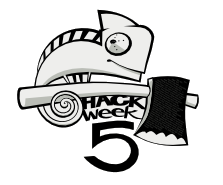 I am really looking forward to the next Hackweek that we have in Novell – it will be in the week from 7-11 of June 2010.
I am really looking forward to the next Hackweek that we have in Novell – it will be in the week from 7-11 of June 2010.
In that week, Novell allows a whole lot of people to spend the full work time (and more 😉 to work on whatever free software they want. That is really a huge thing, because we’re talking about hundrets of engineers.
What everybody is working on is as said not at all prescribed, except that it should benefit the idea of free software. There is a list maintained of ideas which people have for Hackweek Five in order to find somebody joining the team or to pick the idea up at all.
The good thing now is that of course openFATE is used to maintain this list and thus it is open for the openSUSE Community to also add ideas, comment or vote on whats already there. This is of course no guarantee that the idea is going to be picked up but still. So everybody who thinks she has an idea that will inspire someone on Hackweek Five, feel free to add it to openFATE and talk about.
Of course it is also possible and appreciated to work on Hackweek projects also as non Novell employee 🙂
Get in touch – it will be exciting!
Archive for May 28th, 2010
Novell Hackweek Five
May 28th, 2010 by Klaas FreitagHow to set up a Production Server for your Rails App
May 28th, 2010 by Jan LoeserHi folks,
as you know it’s exciting to create a new rails application for several tasks. It’s fast, easy and everything is predefined. But what do you do if your application is (nearly) done? The next logical step is to set up a production web server – for me, this step always was a difficult issue. Mongrel/WEBrick was started via ‘ruby script/server’ and your application was reachable on your localhost, mostly on port 3000. You’re the only user who interacts with it – no problem (as long as your application is in development).
“The Web, however is an extremely concurrent environment. Production web servers, such as Apache, Lighttpd, and Zeus, can work on several requests – even tens or hundreds of requests – at the same time. A single-process, single-threaded Ruby-based web server can’t possibly keep up.” (quoted from ‘Agile Web Development with Rails’)
Therefore I want to show briefly how to set up a front-end server with an existing Rails application using an Apache server and the RubyGem ‘Passenger‘. Do the following as root.
1. Install Passenger (One-click Install) (assumed that Ruby itself and all needed Gems are installed)
2. Install Apache and it’s dependencies:
$> zypper in apache2
3. Add the Passenger module to your Apache server:
$> a2enmod passenger
4. Create a virtual host on your Apache server. Create ‘/etc/apache2/vhosts.d/myapp.conf’ and insert:
<VirtualHost *:80>
ServerName www.myapp.com
DocumentRoot /srv/rails/myapp/public
RailsEnv development
<Directory /srv/rails/myapp/public>
Allow from all
Options -MultiViews
</Directory>
</VirtualHost>
Be sure that the path to your application is correct and do not forget the public directory! As you can see this virtual host receives all requests on port 80 (http). The line ‘RailsEnv development‘ specifies the ‘RAILS_ENV’ variable (in this case ‘development’, the default value is ‘production’). Normally you want ‘production’ for your production server!
5. Activate your virtual host in ‘/etc/apache2/listen.conf’. Just enable the line (remove the leading hash mark)::
#NameVirtualHost *:80
6. Now you can start your Apache server:
$> rcapache2 start
Important: when you want to check the log file be aware of the mode Passenger runs the Rails application (‘production.log’/’development.log’). By default, the log file is written by the user who owns the ‘environment.rb’ – check the log file’s write permissions (See also: User switching).
Have a look at the documentation! There you find a lot of configuration options which you should think of.
That’s it. Sure, there are many many other ways to get such a server running and this was just scratching the surface but should be a good point to start. Thanks to Thomas Schmidt for a good introduction into the topic.
KDE SC 4.5 Beta 1 available for openSUSE
May 28th, 2010 by Raymond WooninckSince yesterday the KDE SC 4.5 Beta 1 packages are available through the openSUSE OBS. They are available in the KDE:KDE4:UNSTABLE:Desktop repository. As announced, this Beta contains the KDEPIM packages from KDE SC 4.4 due to the delay in the conversion to Akonadi. However if you feel really brave, then also the KDEPIM 4.5 packages are available in a subproject (KDE:KDE4:UNSTABLE:Desktop:kdepim45).
The kdepim45 packages will receive daily updates from svn, while the KDE SC 4.5 Desktop will receive weekly updates. Once openSUSE 11.3 has been released, KDE SC 4.5 will be moved to the KDE:KDE4:Factory:Desktop repository.
Enjoy!
openSUSE at FLISoL Chile
May 28th, 2010 by Ricardo Varas SantanaAs you already know, the Festival Latinoamericano de Instalacion de Software Libre event will be held this Saturday here in Chile.
In La Serena we are starting around 9 am at Universidad de La Serena campus Isabel Bongard, with plenty of fun talks and room for installations, I am more than ready to install our awesome green! =). By the way, I will be creating an ISO with SUSE Studio so everyone can grab it on USB devices.
Some talk topics we are presenting: KVM, Free Knowledge, Linux beyond the Desktop, and Contributing to openSUSE without having to be a developer.
I would like to thank Andreas and everyone at Novell who has been supporting the Ambassadors Program, shipping DVDs, Geekos, T-shirts that the audience really appreciates and do make a difference.